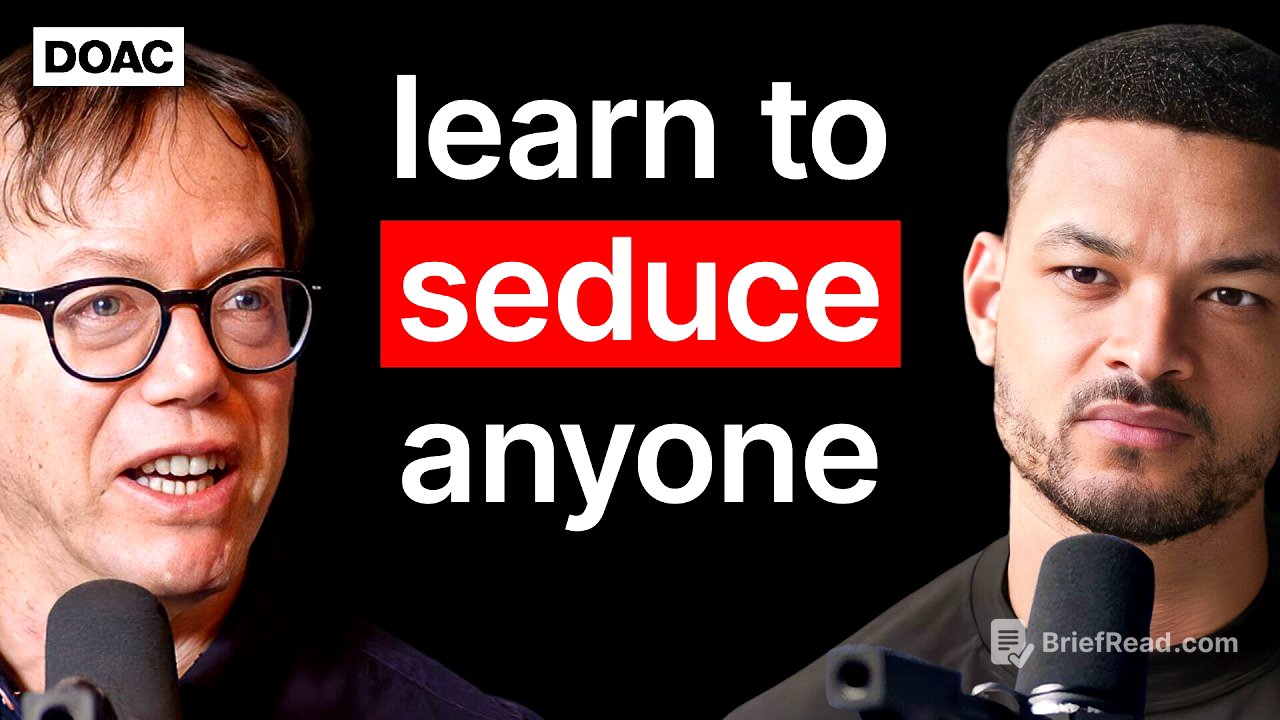TLDR;
Robert Greene, a bestselling author and expert on power and strategy, discusses key concepts from his books, including seduction, power, and mastery. He emphasizes the importance of self-control, understanding human nature, and channeling dark emotions into productive pursuits. Greene also shares personal experiences, including his stroke and recovery, and offers insights on happiness, relationships, and finding one's life task.
- Power is a feeling of control and self-understanding, not just political dominance.
- Seduction is a high form of power that involves making people feel pleasure and lowering their resistance.
- Mastery requires time, effort, and a deep connection to one's chosen field.
- Self-awareness, gratitude, and connection are essential for happiness.
Intro [0:00]
Robert Greene, the internationally renowned expert on power strategies, is introduced. The host highlights Greene's expertise in seduction as a high form of power, where individuals can influence others without them realizing it. Greene's insights into body language, psychology, and self-confidence are teased, promising a discussion on how to master these aspects for personal and professional success.
Your book & its international success [2:14]
Robert Greene discusses his early life, marked by a middle-class upbringing in Los Angeles and a love for books. He describes his diverse job experiences, from construction to detective work, as a search for unique experiences to fuel his writing. Greene recounts the serendipitous moment in Italy where he met a book packager who inspired him to write "The 48 Laws of Power." The book's success is quantified, with over 2 million copies sold in the U.S. and increasing sales in 2023. Greene notes the book's cult following, word-of-mouth popularity, and support from figures like Jay-Z and Drake, which propelled it to international acclaim. Despite societal changes, Greene stands by the book's timeless insights into human nature and power dynamics.
What is power? [11:44]
Power, according to Robert Greene, is not about political figures or grand strategies, but a feeling of self-understanding and control. He emphasizes that power is an intrinsic emotion and a fundamental human need. Greene explains that the feeling of powerlessness can be more corrupting than having too much power, leading to negative behaviors. He advocates for understanding power dynamics to navigate the work world effectively and avoid naivety.
Learn how to use your enemies [22:18]
Greene clarifies that the law "Never trust friends too much, learn how to use enemies" is about separating personal relationships from professional decisions. He advises against hiring friends for important jobs due to emotional complexities. Instead, he suggests considering former enemies, as their motivation to prove themselves can be a powerful asset. The key is to approach work with practicality and strategic thinking, rather than emotional bias.
Conceal your intentions & be a strategist [24:53]
Robert Greene discusses the importance of concealing intentions, emphasizing that the decision to reveal or hide one's plans depends on the circumstances. While sharing a vision can inspire a team, keeping intentions secret can be advantageous in competitive situations. Greene advises a strategic mindset, suggesting that deception and misdirection can be powerful tools in business and life. He highlights the need to be aware of rivals and the benefits of creating mystery to keep them off balance.
Is it being a narcissist good or bad? [33:42]
Robert Greene argues that everyone possesses a dark side, including narcissistic traits. He references Mahatma Gandhi and Martin Luther King Jr. as examples of strategic leaders who, despite their saintly images, employed manipulative tactics to achieve their goals. Greene explains that narcissism stems from childhood experiences and the need for self-love. While extreme narcissism is harmful, a healthy dose of self-esteem is necessary. He advocates for acknowledging and channeling dark emotions into positive actions, such as using anger to fuel social causes or artistic expression.
The power of seduction [42:10]
Seduction is described as a high form of power because it makes people feel pleasure, lowering their resistance and allowing for influence. Greene distinguishes between cold seducers, who are self-serving, and warm seducers, who engage in a mutual game of courtship. A great seducer is outer-directed, attentive, and generous, making others feel validated and recognized.
What makes you anti-seductive? [45:24]
Robert Greene identifies several anti-seductive qualities, including preaching, moralizing, and a lack of generosity. He explains that asserting moral superiority and being stingy with one's time, energy, or resources are deeply unattractive. Insecurity is also anti-seductive, while vulnerability, which involves openness and a willingness to be influenced, can be seductive. Vulnerability signals a need for protection and help, drawing others closer.
Best dating advice for single people [51:18]
Robert Greene advises single people to put effort into dating, viewing it as a biological mating ritual. He emphasizes that gestures and actions speak louder than words, and signals of cheapness or a lack of effort are unattractive. Greene laments the impact of internet porn on young men's expectations of sex and relationships. He stresses the importance of developing social skills through real-world interactions and learning to read body language.
Your body language betrays you [1:02:48]
Robert Greene discusses the importance of body language, noting that it often reveals more than words. He explains that humans have evolved to read non-verbal cues for survival and social harmony. Greene advises paying attention to the eyes, voice, posture, and feet to decipher others' true intentions. He shares the story of Milton Erickson, who, after being paralyzed by polio, became a master of body language. Greene concludes that while learning to read body language is valuable, cultivating inner confidence is the most effective way to project positive non-verbal signals.
Learn the art of mastery [1:11:26]
Robert Greene explains that he wrote "Mastery" out of concern that young people were becoming too focused on manipulation and political games. He emphasizes the importance of developing skills and mastering a subject. Greene argues that the human brain requires time and repetition to build neural pathways and achieve true mastery. He encourages young people to discover their life's task, connect with their natural inclinations, and embrace the tedious aspects of skill development.
Ads [1:26:16]
This chapter contains ads and is skipped.
A stroke changed my life [1:27:17]
Robert Greene recounts his stroke in 2018, which paralyzed the left side of his body and significantly altered his life. He describes the frustration of relearning basic skills and the emotional toll of losing his physical abilities. Greene emphasizes the importance of appreciating one's health and abilities, as they can be taken away unexpectedly. He reflects on the unfairness of the situation, noting the series of events that led to the stroke.
My struggles and how to overcome them [1:34:23]
Robert Greene discusses the psychological challenges he faced after his stroke, including delusion and depression. He explains that it took him about a year to fully realize the extent of his limitations. Greene shares the strategies he used to cope, such as writing, meditation, and shifting his perspective to appreciate what he still had. He emphasizes the importance of connection and gratitude in maintaining peace of mind.
What have you learnt about happiness? [1:39:14]
Robert Greene reflects on what he has learned about happiness since his stroke. He emphasizes that he is still a work in progress and has not solved everything. Greene highlights the importance of purpose, perspective, gratitude, and connection in finding happiness. He acknowledges the role his wife has played in his recovery and the value of appreciating the little things in life.
Last guest’s question [1:48:02]
Robert Greene answers the question of when he was most happy in his adult life. He recalls the turning point at age 38 when he was given the opportunity to write "The 48 Laws of Power." Greene describes the dramatic shift from desperation to success as an intoxicating experience. While the intensity of that happiness has faded, he remains grateful for the opportunity and the journey it has taken him on.









